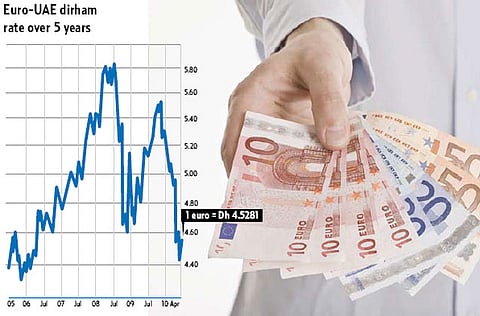Euro's stability not carved in stone
Continuous devaluation threatens existence of common currency and the bloc

Dubai: European expatriates in the UAE have no reason to regret the recent devaluation of the euro. In the last few months, the common currency of the Eurozone has lost around 20 per cent of its value relative to the dollar-pegged dirham, meaning that their salaries rose at the same amount if converted into euros, prompting many to instantly send funds back home.
However, not everyone can be so lucky. People in the Eurozone face a price rise in imported goods, see their holiday spending to dollar-related countries rise and should worry about the overall stability of the artificial currency project which was inaugurated as cash money in 2002.
Nobel laureate Milton Friedman predicted in 2002 that the euro project has no future. "Euroland will collapse in five to 15 years," he said. At that time, many were amused by his pessimism.
But more and more doubts have been arising in recent times about whether the euro is strong enough to cope with the current economic difficulties that certain member states in the Eurozone are facing.
Greece, Spain, possibly Italy, Ireland and Portugal are the countries that haven't done their budgetary homework properly and are now the elements of uncertainty within the 16-member Eurozone and, not to forget, for all the currencies which are pegged to the euro such as the Moroccan dirham, the CFA franc used in 14 countries in western Africa as well as the euro used in Bosnia-Herzegovina and Montenegro.
There have been warning shots by renowned economists and analysts that the euro's stability is not carved in stone. Although the wealthiest nations in Europe have taken powerful precautions to avoid a worst case scenario, things are still worrying. US investor George Soros told the German daily Handelsblatt recently that he wouldn't rule out a collapse of the currency and with it the entire European Union project.
"[A collapse of the euro] would be tragic, because then we might face again conflicts between European countries which already shaped European history," he said. "The efforts to keep the Eurozone together are enormous," believes Michael Rottmann, analyst at European bank group UniCredit. However, in times of crises, he said, the euro suffers from a serious problem.
Too many cooks
Unlike in the US, where fiscal steps are decided by only a few people, in the Eurozone there are around 50 decision-makers who sometimes publish contradictory statements, prompting financial markets to react erratically.
Rottmann does not believe the euro will collapse as long as it stabilises in a range between 1.10 to 1.20 against the dollar. Only a slip below parity with the dollar could herald a collapse.
These are the scenarios if the euro cannot withstand the economic pressure.
n In a first step, the budgetary weaker countries might be pressed to leave the currency union. For example, if Greece would be forced out of the union and needed to introduce a new currency (or reinstate its old, the drachma), this would most likely lead to hyperinflation in a very short period of time.
All Greek government bonds would have been transcribed into the new currency, which would cause most foreign investors to drop them immediately. Government debts would explode, and the country inevitably would have to declare bankruptcy. The euro would return as de-facto currency.
- If Germany the wealthiest country in the Eurozone decided to abandon the common currency as a move of self protection of its economy, this would immediately lead to a collapse of the euro because it would be losing its economic backbone.
Germany might emerge strong out of this scenario, but would be surrounded by countries in critical fiscal condition. Its new currency would rise in value, thus making exports more expensive which in turn would lead to lower production, higher unemployment and tax losses.
- The slow death scenario: As a measure to stabilise the euro, the European Central Bank continues to buy government bonds of the member states and thus indirectly finances those countries' debts.
This inevitably leads to higher inflation rates. Economic growth remains slow, the problem countries remain highly indebted and despite liquidity available on the markets the economic engine does not restart. In the long run, bubbles in the commodity and property markets are building up and jeopardising the fragile system. A headlong crash can be expected at any time.
- With a continued devaluation, investors carry on to shift to the dollar. After the current efforts to depeg the yuan from the dollar, the power matrix of the world's economy could be rewritten totally.



